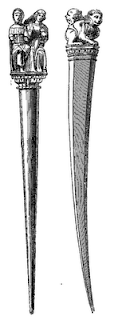Lewis Waterman patented the first workable fountain pen in 1884. However, writing instruments designed to carry their own supply of ink had existed for over one hundred years before Waterman's patent. John Scheffer received a British patent in 1819 for his half quill, the half-metal pen that he tried to put into mass manufacture. And John Jacob Parker patented the first self-filling fountain pen in 1831. However, early fountain pen models were plagued by ink spills and other failures that left them impractical.
Writing instrument-Styli used in the 13 th century
On June 1 st 1969, my mother presented me with my first fountain pen – a beautiful Parker! Her father gave her a beautiful piece while she was in high school. She took care of it and passed it on to me. It thrilled me going to school sporting the pen and begin writing with an ink-filled pen. I ostensibly displayed it in my shirt breast pocket. But when I reached home after school on that fateful day, the pen was gone and only the cap remained stuck in my pocket. How and what came about, I could not explain. And my mother blasted the sheer carelessness. She was distraught and furious. I then wondered why she must fume and curse me for losing a pen, though I felt remorse and guilt inside. It took growing-up and many years of life to fathom the depth and value of a seemingly trivial instrument as the fountain pen, and her pain in my losing it.
Fountain pens were akin to a signature. It told about the person. The longer a fountain pen stayed with a person, the closer it bonded. People of the past seldom offered their fountain pen to another to use or even to pen signature. It was possessed and cared like one's child. And I recall that it was impolite to ask or borrow it from its owner.
When my grandfather used to leave home, he had just a few things to carry or take with him. His glasses, his watch, his money purse, and his fountain pen beside his grandfather's umbrella.
Laptops, calculators, Blackberry, mobile phones, designer sunglasses, wallets stacked with credit cards, and( maybe) a ballpoint pen have now replaced the spartan things people of the past had on their person.
Fountain pens have had their death knell chimed many years ago. Ball pens and digital writing gadgets disposed of after a single use has completely eliminated the stately fountain pen of yore.
The Parkers. Schefers, Swans, the Watermans, Mont Blanc, and everyone have found to their economic advantage that disposable pens are what would thrive today in place of the ink-filled fountain pens.
Commercial possibilities and commonsense have changed peoples tastes, but it is Man who has lost his signature hold on an instrument that could in time, in the past identify its owner because the fountain pen carried his soul along with the ink.



.jpg)


.jpg)
.jpg)




.jpg)
















